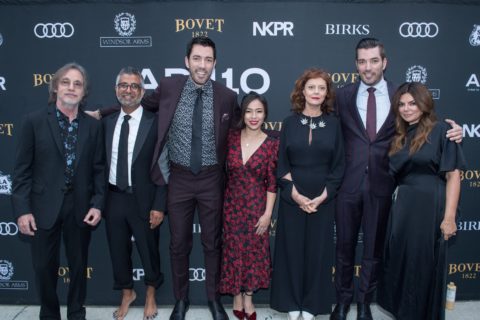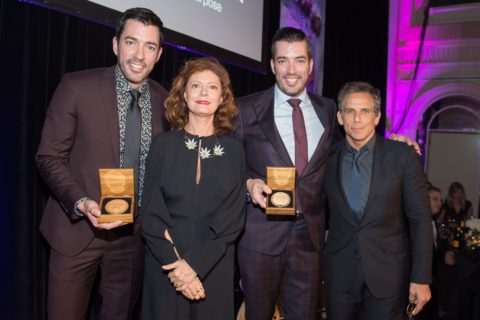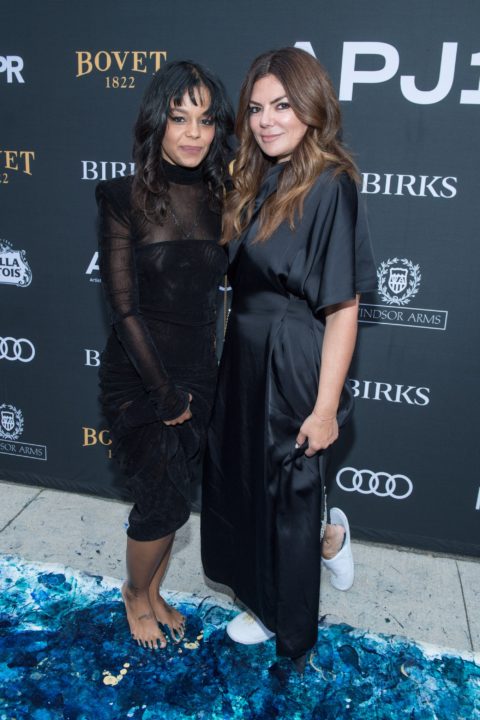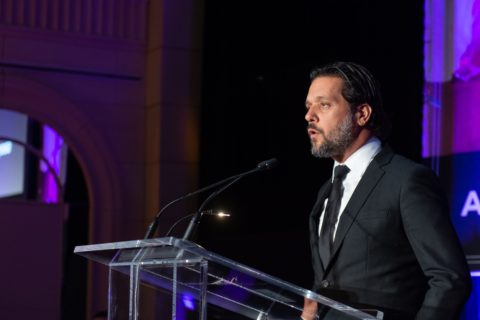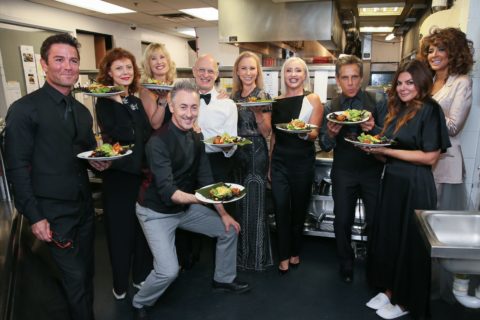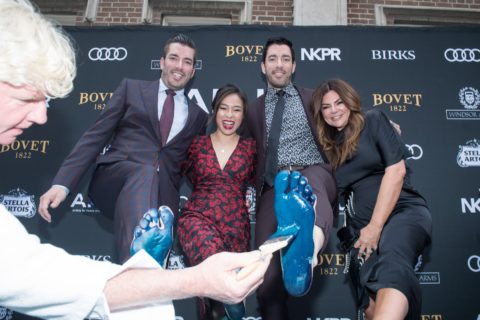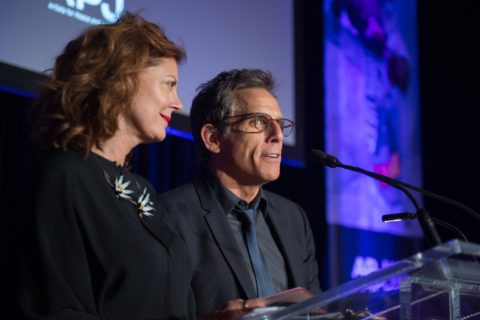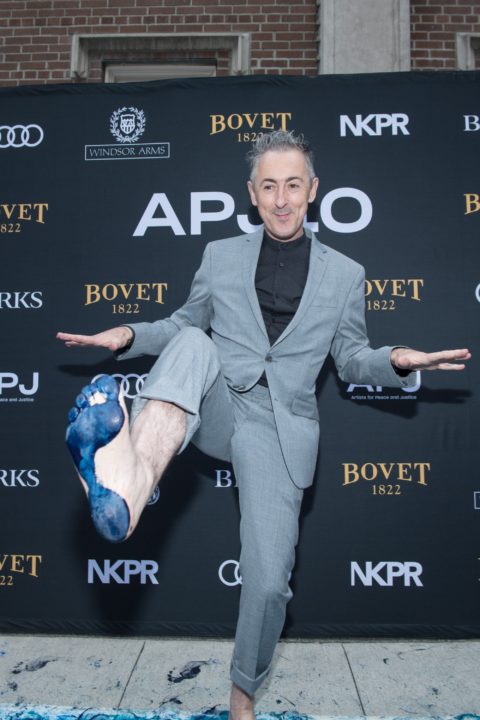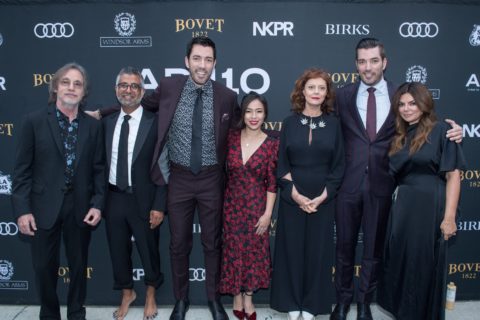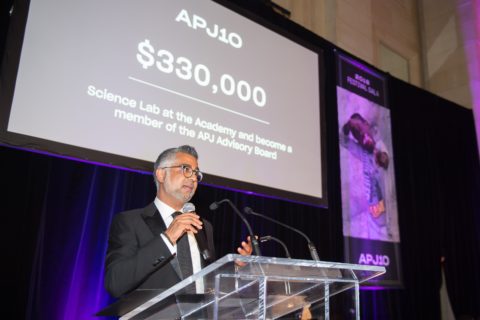The APJ Gala Celebrates 10 Years at TIFF, We Talk to Natasha Koifman About the Charity’s Journey So Far
Red carpets are a standard at the Toronto International Film Festival (TIFF), but a particular carpet event ten years ago definitely stood out. Guests dressed to the nines trekked red paint behind them, creating an ever-morphing art piece with the movements of their bare feet. The spectacle was for the Artists for Peace and Justice (AJP) Gala and this year, a decade later, the organization integrated the wonderfully bizarre performance again, with renowned artist Peter Tunney at the helm.
The gala has become an annual event at TIFF, raising money for APJ, the non-profit organization that wants to encourage peace and social justice around the world. Since its creation, the charity has focused its efforts primarily on Haiti. From the creation of an academy in Port-au-Prince, to the funding of a hospital, their goal is to get the country–which is still reeling from a natural disaster almost a decade ago–back on its feet.
This year, the event was hosted by Ben Stiller and Susan Sarandon, two celebrities who are fierce supporters of the program. Another fierce supporter? Natasha Koifman, president of NKPR and someone who has been part of the APJ team since the very beginning. We got to sit down and chat with Koifman about co-chairing this year’s gala (which raised 1.4 million dollars!) and the organization’s journey so far.
Tell me a bit about APJ and how you got involved.
A bunch of artists in the community–filmmakers, directors–had gone to Haiti just a few months before, and I had met up with them in Los Angeles. They were saying, we really need to do something for this country, for these people, because you have people living on a dollar a day and you have children that are still dying of malnutrition. It’s not acceptable in today’s day for that to be happening. And to be honest, I had no idea about any of this, so I thought okay, let’s create a fundraiser during TIFF. That was ten years ago. But what was interesting about that first time that we did it, is that half the media people on the red carpet didn’t even know where Haiti was. They thought it was in Africa. Like it’s an hour and a half away from Miami where people are partying in South Beach. And so I just remember thinking, ‘Wow! Like that’s unbelievable!’ and then we raised $50,000 at the first event. Fast forward ten years, we’ve raised $30,000,000.
This all started before the devastating earthquake in 2010.
We did the first event September 2009, the earthquake hit in January 2010. And everybody at that point knew where Haiti was. It was devastating and we really felt that. How do we help patients help patients, right? We decided that the best way to do that was through education. So we had a fundraiser in Los Angeles, we raised our first $4,000,000 and it was all through celebrities–Penelope Cruz, Javier Bardam, Daniel Craig, Barbara Streisand–and they all came together and gave $50,000 a year for five years. We went, we bought land and we built our very first free public high school in Port-au-Prince, because they don’t have actual free education beyond junior high.
So, two years after the earthquake, we had our school up and we had our first 800 students. Then three years ago we celebrated our very first graduating class. I was there for that and I cried. You know, sometimes people ask well how do you give back? And you sort of think, you just do. The difference between raising $30,000,000 and not is just actually taking action and doing it. And I feel a tremendous sense of pride every time we do an event and celebrate and raise money, and so does my team. We volunteer and donate all of our time to this really special cause.
The timing in regards to the creation of this charity and then the subsequent earthquake is pretty incredible. It’s almost like fate.
I think that’s the way it works. I think that there are always signs in our life to guide us to where we’re supposed to be and what we’re supposed to do. It’s up to us to choose whether we’re going to act on those or not. And for me, this was something that I felt that at the time, I had to do. And I’ve never looked back since.
You were talking about going to Haiti and being there to watch all the kids graduate. So many of the bigs names that work with APJ actually make the journey out to Haiti. Why do you think that’s important?
Well you have to see what’s going on. I think about when Ben Stiller went to Haiti and we looked at the land, the bare land. You’re giving your money, you’re giving your time, you want to make sure–especially in a country like that, which is very corrupt from a government perspective–that it’s all going to be self-sufficient. And I respect that. I think it shouldn’t just be about giving a cheque, it should be about actually giving up your time and caring about what this is going to be. And so when I think about Artists for Peace and Justice, we are all artists giving back in our own way to be able to create peace for those that don’t have it.
Education is so important when it comes to being self-sufficient.
Yeah, you know we take for granted that we have access to our phones, to social media, to television sets. We can kind of see what our future could potentially be, but they don’t have any of that, so when Westerners come, that’s their only connection to the outside world and the possibilities of who or what they could be. So education is important because it opens up their minds and their worlds. That’s why we decided that we need to help them help themselves. It’s not about just giving them money and hoping something changes. You have to make a long-term commitment. The last time I was there–I remember speaking to my classroom and the kids–one of the boys said, ‘You’re not going to forget about us are you?’ They feel that. They feel that we will because we come in and out. And I assured him we are not going to because as long as we can keep raising money, we’re going to keep these kids in school so that we can help them create a future for themselves.
I agree. It’s easy to do a temporary fix but it’s so much better to help someone succeed in the long run.
We want to empower them. It’s like when you’re empowered to do something, you feel that control right? That’s what we’re trying to do there. We’re just helping them feel a sense of empowerment so that they can feel that they have some control over their own future.
And where do you see the organization going in the future? Do you see APJ taking on any more projects?
I hope so, I know that we want to remain committed to our school, but we also support a school called The Ciné Institute which is like an art and music school, and we also support a local hospital there, so we do support different initiatives within Haiti. We’re starting to broaden a little bit to other countries as well. We’re trying to scale as much as we can but also making sure that we don’t let down the kids that we’ve committed to.
Have you seen a difference in the country since the earthquake in 2010?
Honestly, not really. It’s really devastating. The country is just as devastated as it was before. All that money given to the NGOs didn’t really change much. I wish I could say differently.
That’s hard.
It is, it is actually. I wish I could… You know, at least we have some control with the kids that we’re able to help, but outside of that, you walk through Cité Soleil, it is the most dangerous community in the Western Hemisphere. People walk around with guns, there are gangs everywhere, kids are walking around with no shoes. It’s so impoverished and it’s hard to imagine that this is happening so close to our home.
It’s admirable that you all still travel to help in spite of the safety concerns.
Our life is… we’re lucky. We’re so fortunate with the life that we have, so our job should be to be able to give whatever we can to those that don’t. That is our responsibility as humans.
You are a super busy woman. How do you balance everything?
You know what, you look at what’s important to you. I often play this game with myself called the “Five I am’s,” and I think, what am I? What are the five things that I am that are important to me? That’s how I prioritize my life. Giving back is a priority to me, so I make that a priority. You know, nurturing my team and helping them grow and be as good as they can be, and being able to inject some of that philanthropic essence into them is important to me. I look at those things and that’s how I determine what the priorities are. And it’s different every time, every year they can change. But some don’t, and that’s kind of how… that’s my compass. That’s how I know who I want to be.

